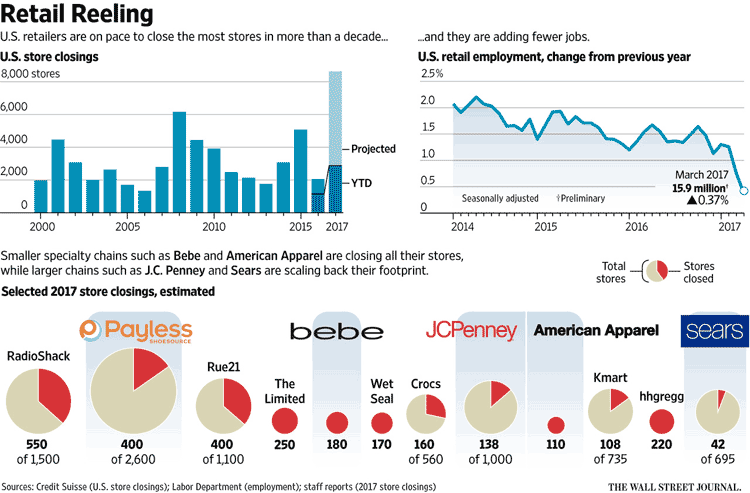Walmart Pressuring Vendors to Reduce CO2 Emissions
Retail giant Walmart has made significant progress in reducing its own CO2 emissions, but says to really have an impact it must drive more change in its extended supply chain.
That means putting pressure on thousands of suppliers to reduce their CO2 emissions too.
Supply Chain Digest Says... |
 |
| Some of the current closing are the result of retailers adding outlets and selling space in the late 1980s and 1990s far beyond the growth in consumers. |
 |
|
|
"We've made progress in our own operations, but this is taking us deeper into our supply chain," said Laura Phillips, Walmart's senior VP for sustainability. "We need our top suppliers to take more action."
Walmart is calling the initiative Project Gigaton because that's how many metric tons of CO2 it wants eliminate from its total supply chain by 2030.
A gigaton is equal to one billion metric tons. If achieved, that would be equivalent to taking more than 211 million passenger vehicles off the road for a year, Walmart said.
Walmart has identified six areas where suppliers can focus their clean energy efforts: agriculture, waste, packaging, deforestation, and product use and design.
Walmart is telling suppliers they will save money as they reduce their CO2 emissions.
In 2009 Walmart released what is called its Sustainability Index, in which suppliers and products - mostly through self-grading - are scored on their sustainability, based on a framework tailored for different product categories. The approach was developed in conjunction with an organization called The Sustainability Consortium, which led the development of the category-specific assessment systems.
Some 1300 Walmart suppliers are said to be subject to the index, and over the years Walmart has put systems in place to better ensure its buyers are considering index scores when making procurement decisions.
Visit the Retail Vendor Performance Management home page to learn more
and subscribe to the monthly newsletter.
 In 2015, Walmart began highlighting companies that scored on the index as "sustainability leaders," dedicating a new section of its website to explaining the designation. More than 3,000 products are marked with the "Sustainability Leaders" badge on the Walmart site, though the company has not shared much information on how if at all that impacts consumer buying behavior. In 2015, Walmart began highlighting companies that scored on the index as "sustainability leaders," dedicating a new section of its website to explaining the designation. More than 3,000 products are marked with the "Sustainability Leaders" badge on the Walmart site, though the company has not shared much information on how if at all that impacts consumer buying behavior.
So how does this new program change things?
"What's new is that we are convening our partners in a way that's going to create a great moment of accountability and action. We've been working on pieces of this, but we haven't packaged it all together into one program that made it easy for others to interact with us, and we haven't shared it all," Phillips said.
"We are initially working with 250 of our top global suppliers, working across multiple product categories like food, personal care products, toys, electronics and apparel," Phillips also said.
Walmart expects its vendors to voluntarily join its Project Gigaton efforts. How will vendor that don't jump in the boat be handled? That isn't yet clear, but we can assume there will be consequences.
Store Closings Continue – but Not all Due to eCommerce
With previous announcements earlier in the year by Macy's, JCPenney, Sears, American Apparel and more, recently women's apparel chain Bebe Stores said it would close its remaining 170 shops and sell only on-line, while teen retailer Rue21 announced plans to close about 400 of its 1,100 locations.
Through April 6, closings have been announced for 2,880 retail locations this year, including hundreds of locations being shut by national chains such as Payless ShoeSource and Radio Shack. That is more than twice as many closings as announced during the same period last year, according to analysis by investment firm Credit Suisse.
Based on historical patterns, Credit Suisse further estimates retailers will close more than 8,600 locations this year in total, which would exceed the number of closings during the deep 2008 recession.

Source: Wall Street Journal
The impact of ecommerce is certainly a factor here, but perhaps surprisingly not the only one. Some of the current closing are the result of retailers adding outlets and selling space in the late 1980s and 1990s far beyond the growth in consumers.
"Thousands of new doors opened and rents soared," Richard Hayne, CEO of Urban Outfitters, told analysts last month. "This created a bubble, and like housing, that bubble has now burst."
Indeed, retail sector analysts have been warning for many years that the US was "over-stored."
"A pair of men's dress pants costs less today than they did a decade ago," Manny Chirico, CEO of Calvin Klein and Tommy Hilfiger parent PVH Inc., observed in a recent interview. Adding to the impact of too many stores of course has also come ecommerce in terms of adding another powerful factor in keeping prices - and margins - low.
Dangerous Games with Vendors for Financially Struggling Retailers
With the wave of retail store closings and bankruptcies, vendors are getting increasingly nervous about shipping goods to many – which can accelerate a troubled retailer’s downward spiral.
"Vendors are getting extraordinarily nervous," recently said Hilldun Corp. CEO Gary Wassner, whose firm finances fashion suppliers.
For example, Bloomberg reports that many vendors are demanding payment terms from wobbling Sears Holdings at as little as one week.
A group of suppliers to Payless Shoes, which recently filed for Chapter 11 bankruptcy protection, sought help from the Chinese government when they said they weren’t getting paid by the retail shoe giant even before its bankruptcy filing.
Struggling retailers can slow payments to vendors to conserve cash, but it’s a dangerous game.
"Lack of faith - and canceled shipments -from vendors and [receivables] factors has precipitated numerous retail bankruptcies," said Christa Hart, a consultant at FTI Consulting.
Your Comments/Feedback
|